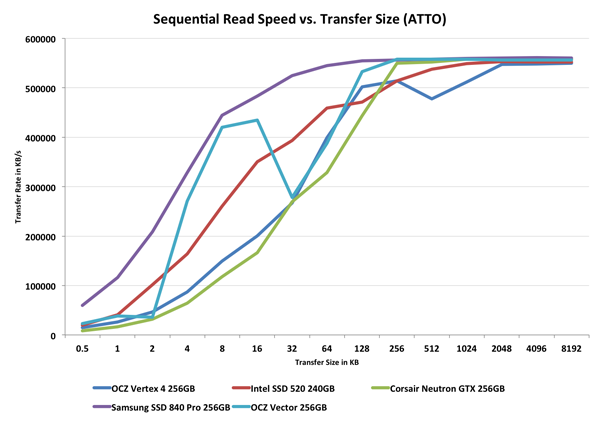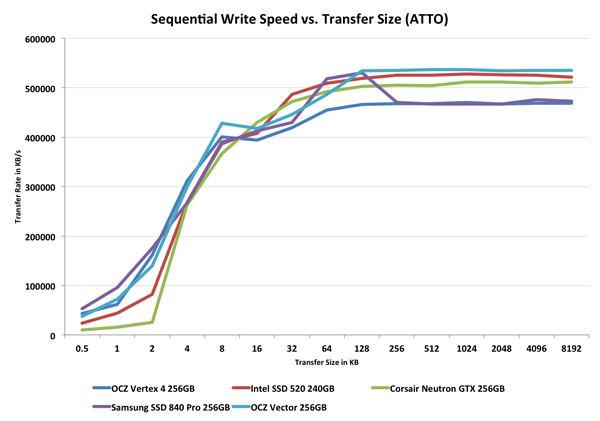OCZ Vector (256GB) Review
by Anand Lal Shimpi on November 27, 2012 9:10 PM ESTPerformance vs. Transfer Size
ATTO does a good job of showing us how sequential performance varies with transfer size. Most controllers optimize for commonly seen transfer sizes and neglect the rest. The optimization around 4KB, 8KB and 128KB transfers makes sense given that's what most workloads are bound by, but it's always important to understand how a drive performs across the entire gamut.
Vector clearly attempts to shift the Vertex 4's performance curve up and towards that of Samsung's SSD 840 Pro. There's a fairly repeatable anomaly at 32KB and 64KB where performance drops down to Vertex 4 levels, but generally speaking there's a tangible improvement across the board. My guess is whatever is happening at 32KB and 64KB is a bug though. Barefoot 3 has no issues parallelizing workloads that are smaller.
I would still like to see improved 512B transfer performance, but other than Samsung it doesn't look like anyone is really focusing on smaller-than-4KB performance anymore. Even Intel has pretty much abandoned focusing on it with its S3700 controller. I may just have to give up caring about it. Smaller than 4KB performance really doesn't impact most client workloads, it's really the weird corner cases where it would matter. Just don't go off and use any of these drives under Windows XP and you'll be fine.
When it comes to write performance, OCZ has delivered a solution that seems to be a hair quicker than the 840 Pro in many of the smaller transfer sizes, and a lot faster once we get to the larger block sizes. Performance vs. the Vertex 4 is clearly improved, and there's only a mild indication of whatever weird issue was happening in the read test.












151 Comments
View All Comments
SodaAnt - Wednesday, November 28, 2012 - link
Its way too large for a msata drive, so it wouldn't fit anyways.somebody997 - Thursday, April 11, 2013 - link
Why is there an mSATA connector on the PCB anyway?somebody997 - Thursday, April 11, 2013 - link
The PCB is far too large for an mSATA drive anyway, so why have the mSATA connector?Anand Lal Shimpi - Wednesday, November 28, 2012 - link
That's likely a custom debug port, not mSATA.Take care,
Anand
Heavensrevenge - Wednesday, November 28, 2012 - link
Actually that connection is indeed a physically identically sized/compatible m-SATA connection. The problem is it's inability to actually plug in due to the SSD's general size or whether it's able to communicate with the typical m-SATA ports on mobos.http://www.pclaunches.com/entry_images/1210/22/tra... should give a decent example.
vanwazltoff - Thursday, December 20, 2012 - link
might be a sign of something else in the works from ocz like an msata cable to plug into it or something, maybe something even more awesome like double the band width by connected it to a ocz pci break off board. i guess we will seemayankleoboy1 - Tuesday, November 27, 2012 - link
I have a Vertex2 256GB SSD.Is it worth upgrading to a Vector or a Samsung840 Pro SSD ?
MadMan007 - Tuesday, November 27, 2012 - link
If you've got a motherboard with SATA 6Gb/s you would probably notice a difference. Whether it's worth it is up to you - do you do a lot of disk-intensive work to the point where you wish it were faster? While I'm the difference would be noticable, it might not be huge or worth spending $200+ on.MrSpadge - Wednesday, November 28, 2012 - link
Are you often waiting for your disk to finish tasks? If not it's not going to be worth it.Beenthere - Tuesday, November 27, 2012 - link
It's going to take more than a nice type written letter to resolve the many product and service issues at OCZ - if they stay in business over the next six to 12 months.FYI- A five year warranty ain't worth the paper it's written on if the company no longer exists. In addition a five year warranty does not mean that a particular product is any better than a product with a one year warranty. For each extended year of warranty, the product price increases. So you're paying for something you may or may not ever use.
In addition it's useful to read the fine print on warranties. Most state that you will receive a refurbished or reconditioned replacement if your product develops a defect. If you've ever seen some of the "reconditioned" or "refurbished" mobos from Asus or similar products from other companies, you'd never install them in your PC.
People reach many untrue conclusions about product quality based on the warranty.